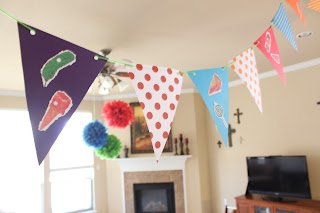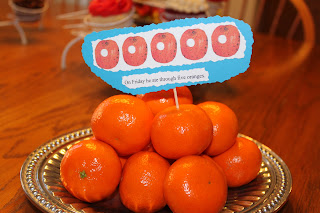Potty Training.
The words alone cause anxiety in many moms I know. When to potty train? What "signs" to look for? To reward or not to reward? To purchase the singing potty, throw confetti every time your kid pees, shower them with candy, stickers, ....or not?
It seems like moms today feel more pressure than ever to "keep up" with each other. There's the need to have kids in the right schools, the right activities, and of course...potty trained by an "acceptable" age. It amazes me that our ability to get a child to use the bathroom can affect how we think of ourselves or our ability as a parent. It shouldn't be that way... but I hear it more and more often. "Why is potty training so hard?" "They don't seem interested." "What should I do?!"
In the back of my mind I think I realized it surely wasn't always this way. I wondered if my mother went through the same theatrics. I can't imagine my grandmother letting my dad aim at cheerios to pee. And, yet, I didn't know anyone doing anything different...so what was I to do?
With my first child I approached potty training the way I thought I was supposed to. I looked for signs of interest (which began with Blake very early.) At twelve months I began occasionally putting her on the potty to poop because she seemed happier that way but I had no intention of starting "real" potty training until 18 months...because I hadn't heard of starting any earlier.
We moved back to TX when Blake was 16 months old and she began Montessori school at 17 months because I was teaching drama there. The teacher let me know after a day or so that she was very interested in watching the other children go potty. (Most of the kids in her class were already 2.) I thought to myself: should I let her try? What if it backfires on me? No one else is potty training there kid this early...should I? Could I?
I decided to just do it. I purchased a simple non-singing potty and some training pants. (Her teacher was very specific in telling me NO PULL-UPS because they can't feel went they're wet. "It's just like wearing a diaper," she said firmly.) I also made a sticker chart and gave her one M&M each time she pooped (looking back I kick myself for that.) It went great - she was in panties all day by 18 months. I weaned her off the sticker chart and the M&M's after a week or two but for months she still would ask for them...which caused me to think they might not have been the best idea to begin with.
Fast forward a year: Now a mommy of two, a Montessori parent for going on two years, and starting to see other options in potty training that would have seemed crazy to me a year prior.
It began at school (of course!) I saw a friend taking her little boy, quite successfully, to the potty (he was 10 months old.) After a potty training conversation she loaned me the book that opened my eyes to potty training in a much simpler and natural way.
This book is wonderful and I recommend it to anyone even thinking about early potty training. It is working amazingly well with my little Beckett (more on that below) But first, the book:
"Diaper Free Before 3: The Healthier Way To Potty Train and Help Your Child Out of Diapers Sooner" (Yes, it's a very long title.) By: Jill M. Lekovic, M.D.
Dr. Lekovic analyzes the history of potty training and looks at potty training in other cultures in comparison to what most of America practices today...it was FASCINATING! This board certified pediatrician and mother of three proclaims boldly in the first page of the book that babies can begin using the potty as early as 6 months. (Crazy, right?!)
Here are some highlights from the book that stuck out in my mind as well as a brief summary of HOW to accomplish this seemingly unbelievable task.
History reveals so many interesting things on the subject of potty training:
According to pamphlets published in the early 1900's if your child was not potty trained by 12 months they were deemed an "idiot to society." (Again, mind boggling.)
In 1914 the United States Children's Bureau published a booklet entitled "Infant Care" which encouraged mothers to begin bowel training by three months or earlier.
In 1957 the average age to begin potty training was 11 months and nearly 100% were potty trained by 18 months.
...And then the disposable diaper enters the picture. Suddenly the need to get babies out of diapers as soon as possible is no longer really there. It's understandable that when moms were washing out cloth diapers every. single. day. they were ready to invest the time and energy to potty train their child as early as physically possible. But disposable diapers offered them a convenience they had never before experienced and they embraced (I probably would have too!)
In 1962 Dr. Brazelton introduced the "readiness" approach to potty training. The included waiting until 18 months to introduce the potty and waiting for those all-important "signs" that a child is "ready" to be potty trained. In the introduction article to his new findings he states: "Since the advent of streamlined diaper care has liberated mothers in our culture from the real need to 'train' their children early, this step may be viewed more honestly as a major developmental task for the child."
Does anyone else see the problems in this thinking? I realize I'm looking at his discovery 50 years later but it says so much to the general thinking of the time. Women needed to be liberated from the home! From childcare! From breastfeeding! It will be great!
...Yeah, not so much. It was this same patriarchal medical establishment that convinced an entire generation of women that giving their babies formula saved them from the onerous, time-consuming, and unseemly task of breast feeding. Of course, the numerous health benefits to breast feeding are apparent now.
That last wide spread survey was conducted in 2004 and showed that many children were still in diapers and showing no interest in potty training until close to their third birthday. The average age to now be potty trained has pushed back to 3.2 years of age.
I find it interesting. History has made it clear that children can be potty trained much earlier. In fact, in current day in many countries around the world children are still potty trained very early. Children in the U.S. are potty trained much later that any other country in the world.
That amazes me...and it makes me a little sad. Though it is, at the same time, very understandable. We are the only country that can afford to spend $7 billion dollars on disposable diapers each year. Our lifestyles today are also very active; disposable diapers and delayed potty training are convenient. ...Until of course the time comes when you HAVE to potty train and by that time it's a battle of wills. You are dealing with a child that can sing their ABC's, names the colors in a rainbow, and can't go potty. Enter frustrated mommy.
And that's a lot of what I see today - frustrated mommies.
Okay, back to the book...she delves into describing potty training in various cultures (all very interesting), and lists the many health benefits to starting early: earlier socialization, decreased risk of infectious diarrhea and hepatitis A, for urinary system development, healthy bowel habits....just to name a few.
Now the question I know you've been asking yourself...HOW?
In three phases.
1. Introduction: this would ideally begin between 6-9 months. At this point you're not really trying to have them use the potty but to be comfortable with it. Potty time becomes a part of their routine...think of it as another place they sit during the day (much like the high chair.) They could sit there for story time or whatever. If they're not happy then you could distract them with a board book or try again later.
Occasionally, they actually go on the potty. This is when you praise them and smile - the message being "the potty is a good place to be." But no theatrics - because let's be honest - this is something they will be doing for the rest of their lives. It's a natural thing. It's a part of everyone's day...and this method treats it as such.
2. Practice: Ideally between 9 months and 2 years of age. Once they start to use the potty more frequently (which can happen surprisingly quickly!!) you begin to visit the potty more frequently. It is a part of their routine. Their body naturally responds to relieving itself in that position and as the parent you 'schedule' your potty visits to best suit your child. What time of day they usually have a BM, ect. The book suggests visiting the potty after waking, after any feedings, before and after naps, before bathtime, ect.
*This stage takes the most "work" as does anything worthwhile. It is time consuming to plan your day around potty times. Making sure you have access to a potty if you're running errands and you know it's the time of day your little one needs to poop is kind of troublesome....but it's a part of life
The great thing about the chapter on "Practice" is that she gives tons of tips and possible routines to help you figure it out.
3. Good Habits: 12 months-3 years. She reveals that most all children trained with this method are reliably dry by age 2. This section is all about continuing good habits and how to handle the occasional accidents.
Others chapters in the book include Starting Later (if your child is already 2 and you're reading this - don't worry! You can do this too!) Potty Training Children with Special Needs and much more.
After reading the book I felt confident (and just a little bit nervous) about trying it with my 8 1/2 month old son, Beckett. This past Thursday we purchased a Baby Bjorn potty that was lower to the ground for his feet to touch. He sat on it three times Thursday for story time. Nothing happened - but I considered it a successful introduction. He was happy. We clapped and said, "Yay! Potty time!"
I decided to have him sit three times Friday as well: after waking, after lunch, and after his afternoon nap. He peed two of the times. I was ecstatic. I clapped...so then he clapped (I know he wasn't sure why exactly he was clapping but after that point he became visibly excited to sit on the potty with his stack of board books beside him.)
And then today something awesome happened. I started paying closer attention to when he seemed restless or uncomfortable when playing and I would take him promptly to the potty. He pooped twice and peed nine times! His body was responding naturally to being in that position and I was figuring out the intervals at which he needed to relieve himself. (Which turns out to be a LOT at his age!)
Needless to say, we will be continuing with this method!
So, early potty training: myth or marvelous?
My vote is MARVELOUS!

















































